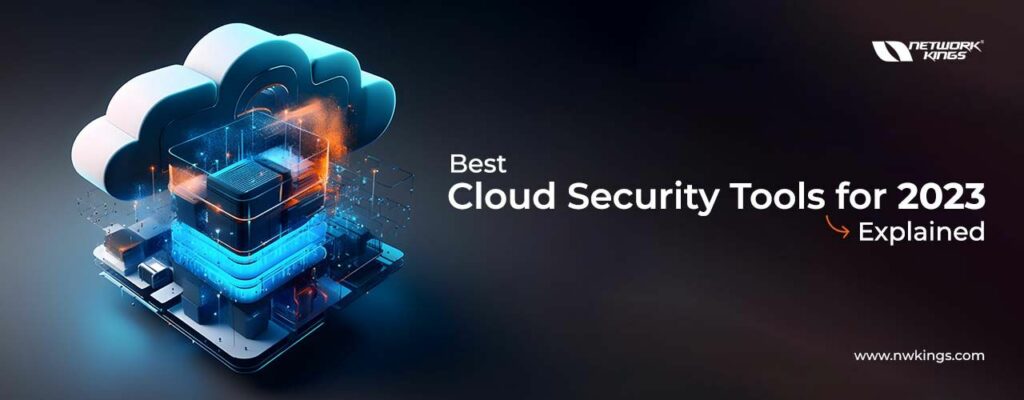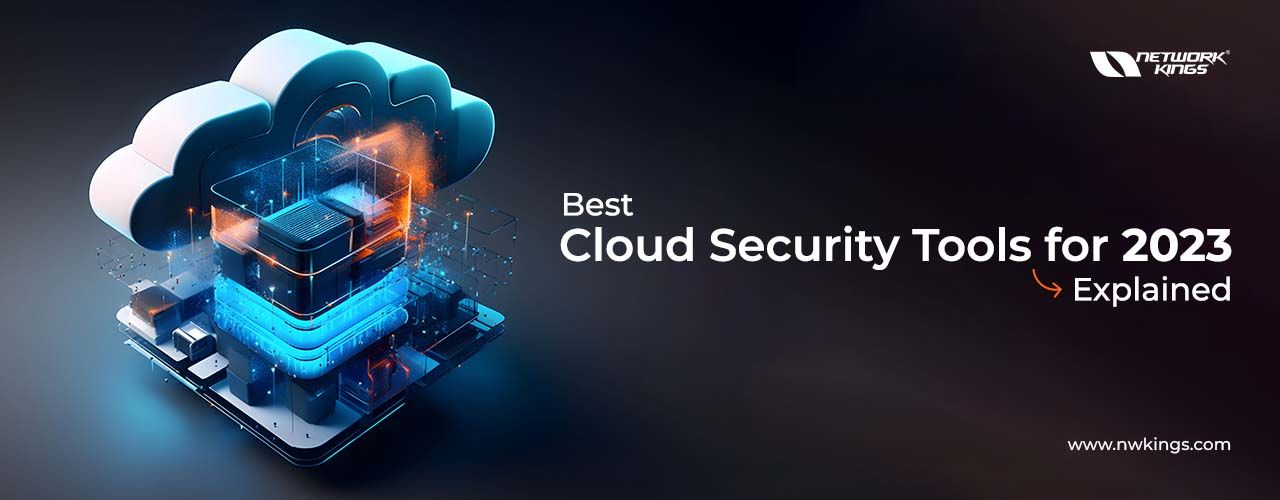
With the rise of cloud computing, it is increasingly essential for organisations to guarantee that they are using suitable tools and techniques to secure their data within the cloud. Cloud Security Tools have consequently become a fundamental aspect of any organisation’s security strategy as they can aid with protecting your data from cyber threats.
This blog will survey multiple cloud security tools and methods, display a list of premier cloud security tools and assess which are the optimal choices for an individual environment. Additionally, we shall provide insight into how these resources can be used proficiently to keep one’s data safe.
Exploring the Demand for Cloud Security Tools

In recent years, Cloud Computing has been experiencing a surge in popularity amongst businesses and individuals alike as they rely upon it to store vast amounts of data securely. Nevertheless, with any technology comes the necessity for consideration towards security; thus, as the demand for cloud-based security tools increases, so does the need for those responsible for maintaining these systems to acquire comprehension regarding how precisely they operate.
This blog intends to explore both the intensifying requirement of cloud safety measures alongside its implications on organisations who depend on them heavily.
The primary issue to consider when evaluating cloud security is the protection against inadvertent or purposeful depreciation or distortion of data stored on the server. Cloud-based services can be vulnerable to a range of risks, such as hacking, malicious software assaults, data theft, and other illicit practices. Consequently, businesses must ascertain that their cloud infrastructure receives suitable defence from potential perils through the implementation of correct security tools and strategies.
A method for achieving this entails utilising encryption technologies which safeguard delicate information preserved in the cloud setting from unauthorised access by external parties. Encryption technologies are particularly advantageous for organisations that operate in industries which demand high levels of confidentiality; encrypting data before transmission guarantees its secure storage within the cloud environment.
Additionally, authentication procedures such as multi-factor authentication (MFA) and single sign-on (SSO) proffer an extra level of security by guaranteeing only authorised users can access essential business information stored inside the cloud arrangement.
Cloud security tools are a necessity for organisations looking to protect their systems from potential attacks and identify any suspicious user behaviour within. Cloud-based monitoring services provide companies with the assurance that they will be kept informed of changes made in their hosted environment, whether such alteration is due to internal or external forces. This proactive approach helps minimise risk and ensures the organisation’s ability to react swiftly if a threat were detected.
As cloud computing technology becomes increasingly popular amongst corporations, there has been an increased demand for reliable cloud security solutions, which can offer protection against unauthorised access attempts by hackers into corporate networks and applications based on shared infrastructures like public clouds while preserving user privacy and data integrity simultaneously. Therefore, having robust cloud security measures in place when migrating IT environments into public clouds would be essential not only for protecting confidential information but also for ensuring proper utilisation of all the advantages associated with it.
Definition and Importance of Cloud Security Tools

As organisations move to the cloud, security tools for clouds are becoming ever more vital. These implements offer a variety of measures designed to protect systems, networks and applications from unauthorised accesses, malevolent activities or any other threats. They assist organisations in guaranteeing that their data remains secure whilst simultaneously helping them establish potential susceptibilities within their systems.
It is possible to find many distinct types of cloud protection instruments. Firewalls can be applied so that entry into systems and networks may be controlled while intrusion detection or prevention structures scrutinise network traffic searching for troubling behaviour.
Encryption technologies may be employed to protect data while travelling or in storage, and antivirus together with anti-malware solutions can help ward off viruses or other malevolent software programs. To ensure that only those who are authorised gain access to certain systems or information, identity management solutions like single sign-on (SSO) and multi-factor authentication (MFA) should also be taken into account.
Additionally, such security measures might usefully supplement firewalls and encryption technologies. Cloud security tools constitute a key component of any organisation’s security architecture; organisations should blend these instruments to form an efficient cloud safety plan fitting their particular needs, which will preserve the integrity of their data and applications.
Detailed List of Top Cloud Security Tools in the Market

Organisations are provided with a scope of solutions for protecting software-as-a-service platforms or cloud deployments from malicious attacks by Cloud Security Tools. The initial step towards ensuring data security and safety in the cloud is to discern which tools should be selected. This article will present an extensive list of the topmost cloud security tools available currently on the market.
- Amazon Web Services (AWS) Identity and Access Management (IAM): AWS IAM allows you to manage user and resource access to your AWS services securely.
- Microsoft Azure Security Center: Provides advanced threat protection across Azure, on-premises, and hybrid cloud environments.
- Google Cloud Security Command Center: Offers security and data risk insights across Google Cloud Platform services.
- HashiCorp Vault: A tool for managing secrets and protecting sensitive data across clouds and hybrid environments.
- CloudGuard (formerly Dome9): Provides security and compliance automation for public cloud environments, including AWS, Azure, and GCP.
- Palo Alto Networks Prisma Cloud: A cloud-native security platform that provides comprehensive protection across the entire development lifecycle.
- Netskope: Cloud security platform that helps protect data and applications in cloud and web environments.
- Symantec CloudSOC (now part of Broadcom): Offers cloud security posture management (CSPM) and cloud access security broker (CASB) capabilities.
- McAfee MVISION Cloud: Provides data protection and threat prevention for cloud services like Office 365 and AWS.
- Trend Micro Cloud One: A comprehensive cloud security platform that includes workload and container security, file storage security, and network security.
- Cisco Cloud Security: Offers cloud-based security solutions, including CASB and DNS-layer security.
- Check Point CloudGuard IaaS: Provides advanced threat prevention, network security, and automation for cloud environments.
- Fortinet FortiCASB: A cloud-native CASB solution that helps secure SaaS applications and IaaS platforms.
- AlienVault USM Anywhere: A unified security management platform that includes cloud security monitoring and threat detection.
- Qualys Cloud Security: Offers vulnerability management, continuous monitoring, and compliance for cloud infrastructure.
How Cloud Security Tools and Techniques Ensure Data Safety?
Cloud security tools are becoming ever more essential for businesses as the rate of cyber-attacks and data breaches goes on to increase. To guarantee their data, organisations must comprehend how cloud security tools and techniques perform. When implemented correctly, cloud security tools can stop information from being misplaced or purloined.
The initial step in protecting a business’s data is choosing the accurate cloud security tool for its requirements. By opting for a safe platform with dependable authentication protocols, encryption services, and web application firewalls, firms can keep their data safeguarded from malignant actors.
It is essential that the chosen service also offers regular updates, to ensure it remains resilient against novel forms of attack. Upon selecting a suitable cloud security tool for business purposes, it should be properly configured according to their requirements. This involves designating access privileges so only authorised personnel can gain entry to confidential files and implementing rules which limit user behaviour on the system; such as what type of documents they are permitted to upload or download. Additionally, ongoing reviews regarding permissions must take place whilst any unauthorized users ought to be removed without delay if necessary.
Employing two-factor authentication is also a wise move as it provides an extra layer of security by requiring users to enter a username and password before gaining access. Organisations should be sure that any systems associated with their cloud storage are kept consistently up to date with the latest security patches and anti-virus software, for them to reduce susceptibility towards attack.
Moreover, they ought to avail themselves of features such as logging and auditing capabilities, which enable them to monitor user activity on the system so they can detect any malicious behaviour swiftly and respond accordingly.
There is no alternative when dealing with sensitive data online other than having adequate cloud security; however, selecting appropriate tools along with properly configuring these components only constitutes part of the process – businesses must additionally educate their personnel about correct practices whilst utilising remote systems if they hope to remain secure from cyber criminals.
Best Cloud Security Tools Used in the IT Industry
Cloud-based security tools have become increasingly significant within the IT industry as firms endeavour to safeguard their data and networks from cyber threats. In light of the swift growth of cloud-based services, cloud security has attained a greater degree of importance than ever before. Bearing in mind that organisations depend heavily on computing clouds for their day-to-day operations, having strong safety features is essential to secure information and networks. A range of various kinds of protective appliances exist which offer assistance when it comes to keeping cloud systems safe and sound.
NOTE: The first form of protection an organisation should contemplate utilising is identity access management (IAM).
IAM Solutions provides organisations with a centralised platform for the management of user identities, access privileges and authentication policies across their network. This allows companies to easily manage who has permission to avail which resources, guaranteeing that only authorised users can gain entry into sensitive files or data. Furthermore, IAM also enables organisations to protect their cloud environment from unauthorised users or cybercriminals.
The use of encryption technology serves as an additional safeguard against threats by scrambling data such that it cannot be deciphered except by its intended recipient. Thus, in combination with IAM solutions, this ensures improved security measures at all levels within any organisation’s cloud environment.
Providing an additional layer of defence against those with nefarious intentions seeking to pilfer sensitive information from a company’s system, encryption also ensures the privacy of customer data stored in the cloud is preserved as providers are unable to access it without permission. Intrusion detection systems prove integral for preventing unauthorised persons from accessing a company’s network; these systems observe traffic on networks and alert administrators when suspicious activity or use of resources surfaces.
NOTE: Offering organisations advanced warning about potential threats, intrusion detection systems allow them sufficient time to take preventative measures before malicious actors cause any damage.
There exist multiple security tools that can assist businesses in protecting their records and networks from external risks and malicious individuals. These incorporate identity management solutions, encryption technology as well and intruder recognition mechanisms – all being essential components in abating risk posed by cyberattacks executed against business operations located within cloud computing environments.
Features and Benefits of Leading Cloud Security Tools
Cloud security tools are of paramount importance to safeguard data stored on the cloud. The features and advantages offered by these solutions differ according to the vendor. A multitude of them provide capabilities including encryption, user authentication, Data Loss Prevention (DLP), and malware detection. Encryption serves as a mechanism for securing information that can be utilised to prevent unauthorised access to confidential documents.
User authentication guarantees that only those with authentic credentials may gain entrance into the system, while DLP obstructs unintentional or purposeful exposure of sensitive details. Malware recognition is likewise critical to avert malevolent software from infiltrating systems and networks.
Many cloud security tools afford users the capacity to configure their regulations regarding what data should be encrypted and which users ought to have access to particular resources. This precise regulation of authorisation assists organisations in managing their risk profiles adeptly.
Moreover, premier cloud security systems offer centralised recording for supervising activity across distinct frameworks, informing people when something abnormal occurs or when privileged individuals endeavour to alter or delete information without permission. Lastly, these instruments usually comprise reporting facilities that allow IT teams to follow usage tendencies within an organisation over time and spot any prospective issues before they become serious predicaments.
The Role of Cloud Security Tools in Preventing Cyber Threats
Cloud security tools have become an increasingly pertinent matter due to the increasing prevalence of cyber threats. As more and more companies transition their operations online, it has become necessary for organisations to guarantee that their confidential data is secure and protected. Cloud security tools are indispensable for businesses looking at safeguarding themselves from malevolent actors. These utilities bestow organisations with improved tracking capabilities, enabling them to recognise and take action against potential hazards promptly and effectively.
Such software comes in many guises including firewalls, antivirus programs, intrusion detection systems; vulnerability scanners cloud access control technologies amongst other things. Each of these devices works together to guard data against malicious assailants via encryption algorithms and restrictions policies along with several other safety protocols.
Consequently, by applying a combination of such cloud security instruments enterprises can significantly abate the likelihood of any breach or information compromise caused by a cyber attack. Therefore, corporations should think seriously about making use of such solutions if they wish to stay ahead in this ever-evolving domain which harbours numerous cyber dangers.
Cost-effectiveness of Investing in Cloud Security Tools
Investing in cloud security tools can be a cost-effective approach to defending against malicious actors. With the advent of cloud computing technology, organisations can take advantage of the versatility and scalability, which is provided by cloud services while still being able to mitigate any risks that relate to data security.
Cloud security tools make it possible for increased automation and analytics capabilities; this reduces the amount of manual intervention necessary when managing security policies. In addition, due to their subscription-based business model, these sorts of tools can be scaled according to an organisation’s needs readily; making them more affordable than conventional on-premises solutions, which require considerable upfront investments initially.
Furthermore, cloud security tools hold their worth over some time as they are regularly refreshed with new features and repairments, which help organisations to remain safe from the constantly surfacing cyber risks. Additionally, many organisations are also taking advantage of Artificial Intelligence (AI) capabilities in cloud security resources to detect threats that would otherwise go unseen.
This not only provides support for organizations against malevolent actors but also bestows them with intricate knowledge about patterns on their networks that aid in decisions regarding risk mitigation strategies into the future. In conclusion, investing prudently in an apt cloud security tool is a proficient way of attaining harmony between cost-effectiveness and data protection for any organisation within today’s digital sphere.
Future Trends in the Development and Application of Cloud Security Tools
The progression of cloud security tools is a continual process that perpetually advances in tandem with the unceasing expansion of technology. As corporations transfer their records to the cloud, they must guarantee that their data, applications and systems remain secure and safeguarded against cyber threats.
Consequently, they necessitate technologies and solutions which can effectively keep their data protected from hackers and malevolent entities. To realize this goal, numerous enterprises are looking towards creating or bettering existing cloud security tools to guard their information.
An instance of this is the application of Artificial Intelligence (AI). AI algorithms are being used increasingly often to observe illicit activity on networks, frequently before human administrators have even realized there might be a potential danger. Moreover, AI can be employed together with other security tools, such as firewalls to defend data from external sources.
Cloud security instruments powered by AI offer an extra level of defence for businesses by uninterruptedly observing any dubious behaviour and blocking all endeavours at unapproved access. Apart from that, another pattern in cloud safety tool growth involves providing greater perceptibility into system action.
With improved visibility into network traffic flow, organisations can identify unusual behaviour more quickly and take action before a breach occurs. Cloud-based network visibility solutions aid companies in attaining greater control over their networks while simultaneously providing them with statistical insights concerning how these networks are used by users or devices situated both inside and outside the organisation’s perimeter; this assists corporations in preventing data leakage or other malign activities, which may otherwise arise without such an intricate level of granular visibility.
Finally, blockchain technology is widely perceived to be among the most promising emerging trends when it comes to development regarding cloud security tools. Blockchain relies upon distributed ledger technologies as a technique for securely storing records; additionally, it enables authorised transactions between multiple participants within any given system.
By embracing blockchain technology at its core infrastructure layer, firms can construct automated systems that are inviolable and immutable whilst remaining highly secure – thereby enabling them to transfer useful information/data across different networks safely without fear of manipulation or theft carried out by malevolent parties en route.
Businesses can benefit greatly by making use of cloud security tools and techniques. These may include forms such as encryption, identity management, monitoring and more. A comprehensive list of the top cloud security tools is available to enable companies to select the most appropriate solution for safeguarding their data against cyber threats. By utilising these tools effectively, organisations can attain maximum protection for any crucial information they possess.
What courses can help me acquire the top cloud computing skills in IT?
The courses that can help me acquire the top cloud computing skills in IT are as follows-
AWS Solutions Architect
This course focuses on designing scalable and reliable solutions on Amazon Web Services (AWS), covering architectural best practices, service selection, and cost optimization for AWS cloud environments.
The exam details for the AWS Solutions Architect certification program are as follows-
Exam Name | AWS Certified Solutions Architect – Associate exam |
Exam Code | SAA-C02 |
Exam Level | Associate |
Exam Duration | 130 minutes |
Total Questions | 65 (MCQs and multiple response questions) |
Exam Cost | 150 USD |
Passing Score | 720 out of 1000 |
Exam Language | English, French, German, Italian, Japanese, Korean, Portuguese, Chinese and Spanish |
Testing Center | Pearson Vue |
AWS DevOps
AWS DevOps training teaches the principles of DevOps on AWS, emphasizing automation, continuous integration/continuous delivery (CI/CD), and infrastructure as code to streamline software development and deployment.
The exam details for the AWS DevOps certification program are as follows-
Exam Name | AWS Certified DevOps Engineer Professional exam |
Exam Code | DOP-C01 |
Exam Level | Professional |
Exam Cost | 300 USD |
Exam Format | MCQs or Multiple Response Questions |
Total Questions | 75 questions |
Passing Score | 750 out of 1000 |
Exam Duration | 180 minutes |
Languages | English, Simplified Chinese, Korean, and Japanese |
Testing Center | Pearson Vue testing center or online proctored exam |
Microsoft Azure
This course explores Microsoft’s cloud platform, Azure, covering various services for cloud computing, storage, networking, and application development within the Azure ecosystem.
The exam details for the Microsoft Azure certification program are as follows-
Exam Name | Microsoft Azure Administrator |
Exam Code | AZ-104 |
Exam Cost | USD 165 |
Exam Format | Multiple-choice questions |
Total Questions | 40-60 questions |
Passing Score | 700/1000 |
Exam Duration | 150 minutes |
Exam Language | English, Japanese, Chinese, Korean, Spanish, French, German, Italian, Indonesian |
Testing Center | Pearson VUE |
GCP Cloud
Google Cloud Platform (GCP) training provides insights into Google’s cloud services, including computing, data storage, machine learning, and cloud-native tools for application development.
The exam details for the GCP Cloud certification program are as follows-
Exam Code | GCP-ACE |
Exam Cost | USD 125 |
Number of Questions | 50 |
Test Format | Multiple Choice |
Duration | 120 Minutes |
Passing Score | 70% |
Docker
Docker training focuses on containerization technology, teaching how to create, deploy, and manage lightweight, portable containers for applications and microservices.
The exam details for the Docker certification program are as follows-
Exam Name | DCA (Docker Certified Associate) |
Exam Cost | 195 USD |
Exam Format | Multiple-choice questions |
Total Questions | 55 questions |
Passing Score | 65% or higher |
Exam Duration | 90 minutes |
Languages | English, Japanese |
Testing Center | Pearson VUE |
Certification validity | 2 years |
Kubernetes
Kubernetes training covers container orchestration, teaching how to manage and scale containerized applications efficiently using Kubernetes, an open-source container orchestration platform.
The exam details for the Kubernetes certification program are as follows-
Exam Name | Kubernetes Certified Administrator (CKA) |
Exam Cost | 300 USD |
Exam Format | Performance-based exam (live Kubernetes cluster) |
Total Questions | 15-20 tasks |
Passing Score | 74% or higher |
Exam Duration | 3 hours |
Languages | English, Japanese |
Testing Center | Pearson VUE |
Certification validity | 3 years |
Where should I enroll for these courses?
To enroll for the aforementioned cloud certification courses, one must choose a training platform with the best mentors providing quality education. And one such platform is Network Kings.
The pros of choosing Network Kings for the Cloud certification course training program are as follows-
- Learn directly from expert engineers
- 24*7 lab access
- Pre-recorded sessions
- Live doubt-clearance sessions
- Completion certificate
- Flexible learning hours
- And much more.
Wrapping Up!
Are you seeking to remain ahead of the game in cloud technology? If so, then there can be no better place than our cloud courses. We present an extensive selection of openings for gaining knowledge about all aspects related to the cloud, from basic ideas to more advanced ones. With our proficient and knowledgeable tutors, you will have the capacity to cultivate a thorough comprehension of up-to-date technologies and stay on top of rapidly fluctuating trends in cloud computing. The courses are as follows-
So why are you delaying? Sign up for our cloud courses today and get headed towards becoming an expert within this crucial area of technology!




